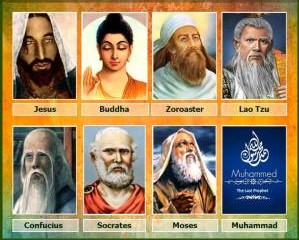
Most who have read any C. S. Lewis at all are familiar with his oft-quoted Liar-Lunatic-God “trilemma” in Mere Christianity. It exposes the false notion that Jesus can be a great moral teacher while at the same claiming to be God.
In a short essay entitled “What Are We to Make of Jesus Christ,” found in God in the Dock, Lewis addresses that subject again, but from a different angle. He begins by showing that Jesus does offer “clear, definite moral teaching,” and, as in Mere Christianity, notes that other claims by Jesus, if untrue, would make him a “megalomaniac, compared with whom Hitler was the most sane and humble of men.” It’s after that statement that he provides a thought experiment with regard to other religious teachers.
“There is no half-way house and there is no parallel in other religions,” Lewis explains.

If you had gone to Buddha and asked him, “Are you the son of Bramah?” he would have said, “My son, you are still in the vale of illusion.”
If you had gone to Socrates and asked, “Are you Zeus?” he would have laughed at you.
If you had gone to Mohammed and asked, “Are you Allah?” he would first have rent his clothes and then cut your head off.
If you had asked Confucius, “Are you Heaven?” I think he would have probably replied, “Remarks which are not in accordance with nature are in bad taste.”
But Jesus went way beyond what those others offered the world: He either was God or a lunatic claiming to be God. Lewis also notes that when Jesus walked those dusty roads of first-century Judea and Galilee, people didn’t regard Him as merely a great moral teacher. “He did not produce that effect on any of the people who actually met Him.” Instead, people either hated Him, feared Him, or adored Him. “There was no trace of people expressing mild approval.”
While other teachers had said things like “This is the truth about the Universe. This is the way you ought to go,” Jesus countered with statements such as “I am the Truth, and the Way, and the Life.”

Lewis then provides a litany of paraphrases of Jesus’s message:
“No man can reach absolute reality, except through Me.”
“Try to retain your own life and you will be inevitably ruined.”
“Give yourself away and you will be saved.”
“If you are ashamed of Me, if, when you hear this call, you turn the other way, I also will look the other way when I come again as God without disguise.
Lewis concludes the essay with possibly the most important claim other than Jesus’s Godhood:
Your sins, all of them, are wiped out, I can do that. I am Re-birth, I am Life. Eat Me, drink Me, I am your Food. And finally, do not be afraid, I have overcome the whole Universe.”
That is the issue.
Yes, that is the issue, and the call still goes out to sinful humanity:
As God’s fellow workers, then, we urge you not to receive God’s grace in vain. For He says:
2 Corinthians 6:1-2
“In the time of favor I heard you,
and in the day of salvation I helped you.”
Behold, now is the time of favor; now is the day of salvation!
